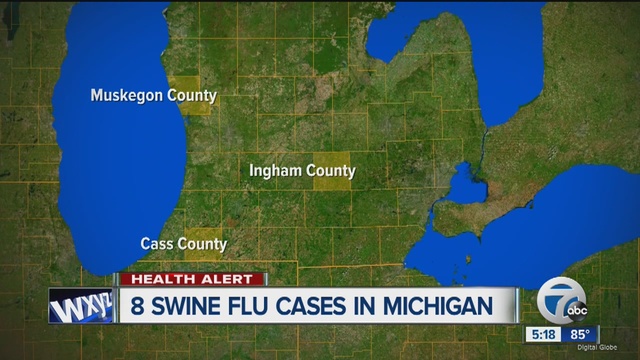-
Tips for becoming a good boxer - November 6, 2020
-
7 expert tips for making your hens night a memorable one - November 6, 2020
-
5 reasons to host your Christmas party on a cruise boat - November 6, 2020
-
What to do when you’re charged with a crime - November 6, 2020
-
Should you get one or multiple dogs? Here’s all you need to know - November 3, 2020
-
A Guide: How to Build Your Very Own Magic Mirror - February 14, 2019
-
Our Top Inspirational Baseball Stars - November 24, 2018
-
Five Tech Tools That Will Help You Turn Your Blog into a Business - November 24, 2018
-
How to Indulge on Vacation without Expanding Your Waist - November 9, 2018
-
5 Strategies for Businesses to Appeal to Today’s Increasingly Mobile-Crazed Customers - November 9, 2018
MI confirms 8 human cases of flu spread by pigs
After testing positive for swine flu, the pigs were treated with aspirin to help bring their fevers down.
Advertisement
The Michigan Department of Health and Human Services says that eight people have now been confirmed to have contracted the swine flu in Michigan.
In a joint statement, the two agencies are working “closely” with local health departments, the health care community and fairs to identify any additional cases and to protect exhibitors and the public.
Confirmed cases have been linked to animals in Cass, Muskegon and Ingham counties.
The federal government says MI had nine cases from 2012-2015.
However it may spread to people in a couple of ways: when an infected pig coughs or sneezes, an infected droplet may land on a person’s mouth or nose or inhaled in. Currently, there is no vaccine for H3N2v and the seasonal flu vaccine will not protect against H3N2v.
Another way is by touching something that already has the virus on it and then touching your own mouth or nose.
You can reduce the odds of getting infected by avoiding pigs and swine barns at fairs.
In addition, health officials advise people should not eat or drink in livestock barns or show rings, and not take toys, pacifiers, cups, baby bottles, strollers, or similar items into pig areas.
-Avoid contact with pigs if you have flu-like symptoms.
-Wash your hands often with soap and water.
Advertisement
People who are considered at higher risk for complications include children under the age of five, people 65 and older, pregnant women, and people with health conditions like asthma, diabetes, heart disease, weakened immune systems, and neurological or neurodevelopmental conditions.





























